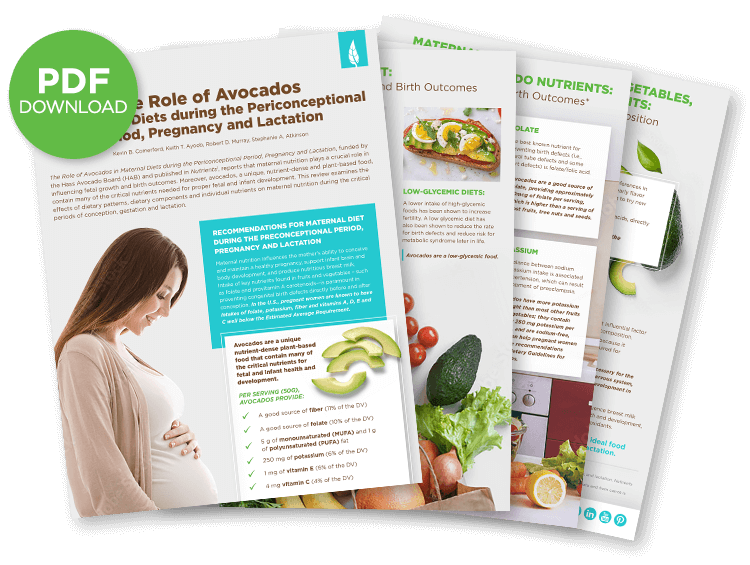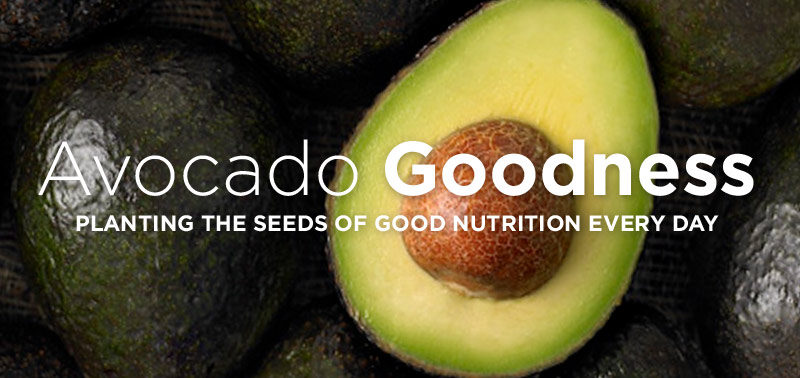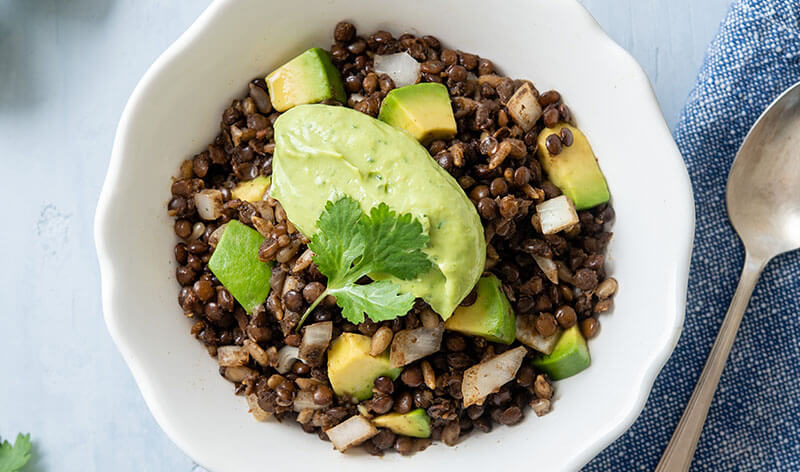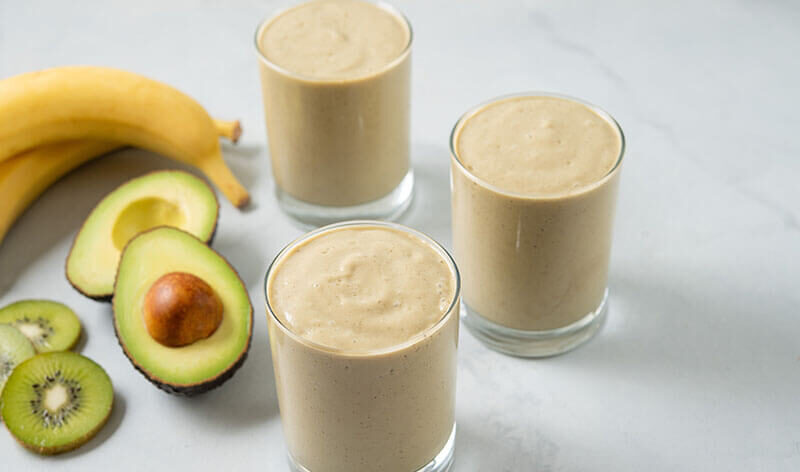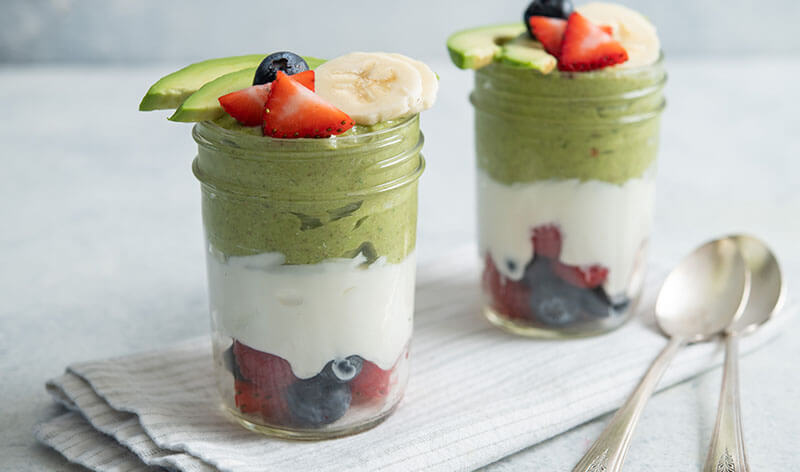Study Overview
This 2014 publication, funded by the Avocado Nutrition Center and published in Nutrients 1, reports that maternal nutrition plays a crucial role in influencing fetal growth and birth outcomes. Moreover, avocados, a unique, nutrient-dense and plant-based food, contain many of the critical nutrients needed for proper fetal and infant development. This review examines the effects of dietary patterns, dietary components and individual nutrients on maternal nutrition during the critical periods of conception, gestation and lactation.
Published: Nutrients
Study funded by Avocado Nutrition Center
Category: Healthy Living at Every Age, Type 2 Diabetes
Download Scientific Summary PDF
See Published Review
Recommendations for Maternal Diet during the Preconceptional Period, Pregnancy and Lactation
Maternal nutrition influences the mother’s ability to conceive and maintain a healthy pregnancy, support infant brain and body development, and produce nutritious breast milk. Intake of key nutrients found in fruits and vegetables – such as folate and provitamin A carotenoids—is paramount in preventing congenital birth defects directly before and after conception. In the U.S., pregnant women are known to have intakes of folate, potassium, fiber and vitamins A, D, E and C well below the Estimated Average Requirement.
Avocados are a unique nutrient-dense plant-based food that contain many of the critical nutrients for fetal and infant health and development. Per serving (50g), avocados provide:
- A good source of fiber (11% of the DV)
- A good source of folate (10% of the DV)
- 5 g of monounsaturated (MUFA)
- 1 g of polyunsaturated (PUFA) fat
- 250 mg of potassium (6% of the DV)
- 1 mg of vitamin E (6% of the DV)
- 4 mg vitamin C (4% of the DV)
Maternal Diet:
Effects on Fertility, Fetal Growth, and Birth Outcomes
Mediterranean diet:
A maternal Mediterranean diet has been associated with significantly improved health outcomes including up to a 90% lower risk for preterm delivery and a nearly 70% lower risk of ovulatory disorders in infertile women when compared to diets that are high in trans fats. Additionally, it has been shown to lower total and low-density lipoprotein (LDL) cholesterol levels for the mother.
Avocados are Mediterranean-style foods because they are a fruit and naturally rich in MUFA.
Low-Glycemic Diets:
A lower intake of high-glycemic foods has been shown to increase fertility. A low glycemic diet has also been shown to reduce the rate for birth defects and reduce risk for metabolic syndrome later in life.
Avocados are a low-glycemic food
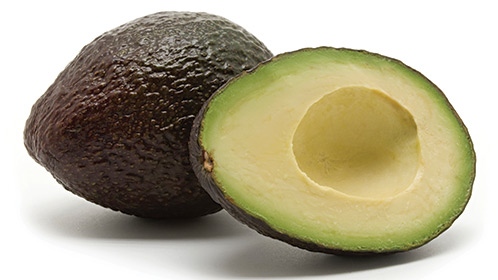
Fruits and Vegetables:
Research shows maternal consumption of fruits and vegetables is an important part of a healthy and protective diet throughout pregnancy and early life.
As a fruit, avocados provide…
- Potassium
- Folate
- Provitamin A carotenoids
- Fiber
- Magnesium
- Vitamin C
- Thousands of bioactive compounds that may also have beneficial effects on pregnancy
Maternal Intake of Key Avocado Nutrients:
Effects on Fertility, Fetal Health, and Birth Outcomes*
* One serving of avocado is 50g or 1/3 of a fruit.
MUFA (Oleic Acid)
MUFA’s make up a large portion of an infant’s blood fatty acid profile, and research suggests that a greater intake of MUFA can help to improve a woman’s fertility.
Avocados can be an important source of MUFA providing 5 g of MUFA per serving.
Fiber
Low fiber intake is associated with an increased risk for several maternal diseases (i.e., chronic constipation, type 2 diabetes, and hypertension/preeclampsia) that have consequences to the fetus.
Avocados are a good source of fiber (3 g of fiber per serving), with a ratio of 70% insoluble to 30% soluble fiber.
Folate
The best-known nutrient for preventing birth defects (i.e., neural tube defects and some heart defects) is folate/folic acid.
Avocados are a good source of folate, providing approximately 40mcg of folate per serving, which is higher than a serving of most fruits, tree nuts and seeds.
Lutein
Lutein is critical for proper eye development in utero, especially in the third trimester.
One serving of avocado contains approximately 136 mcg of bioavailable lutein.
Vitamin A
Vitamin A is an important antioxidant that exhibits a range of functions involving eye health, immune function, and neurological development.
One serving of avocado contains 30 mcg of provitamin A carotene. Additionally, eating avocado with tomatoes or carrots significantly increases absorption of provitamin A carotene and significantly increases the conversion to vitamin A2.
Potassium
An imbalance between sodium and potassium intake is associated with hypertension, which can result in development of preeclampsia.
Avocados have more potassium by weight than most other fruits and vegetables; they contain roughly 250 mg potassium per serving and, are sodium-free, which can help pregnant women meet the recommendations of the Dietary Guidelines for Americans.
Maternal Intake of Fruits, Vegetables, and Key Avocado Nutrients: Effects on Milk Production and Composition
Maternal consumption of fruits and vegetables is associated with specific flavor preferences in breastfed infants from the variety of food flavors received through the milk. These early flavor experiences may help explain why infants who are breastfed tend to be more willing to try new foods and may contribute to greater fruit and vegetable consumption later in life. Maternal intake of vitamin A, vitamin B6 and vitamin B12, as well as iodine and fatty acids, directly influence the composition of breast milk.
Few fruits or vegetables are rich in both vitamins and fatty acids, with the exception of MUFA containing fruits such as avocados.

MUFA (Oleic Acid)
Maternal lipid intake is the single most influential factor contributing to breast milk fatty acid composition.
MUFA is critical to breast milk quality because it helps maintain the proper liquidity required for breast milk formation. MUFA, along with PUFA, are also necessary for the proper development of the human nervous system, and structural and functional brain development in the first year of life.
Lutein
Lutein represents roughly 25% of the carotenoids in breast milk in the first few days of breastfeeding and increases to nearly 50% by the end of the first month.
Lutein is the most abundant carotenoid in avocados; and it is absorbed in greater quantities from avocados relative to other fruits and vegetables with low or no fat content.
Maternal nutrition plays a crucial role in influencing fetal growth and birth outcomes and can also influence breast milk composition of certain nutrients. Avocados contain many of the critical nutrients for fetal and infant health and development, such as folate, potassium, carotenoids and other key compounds such as fiber, MUFA and antioxidants. Based on this review, avocados, when eaten as part of a healthy diet, are an ideal food choice for the periconceptional period, as well as during pregnancy and lactation.
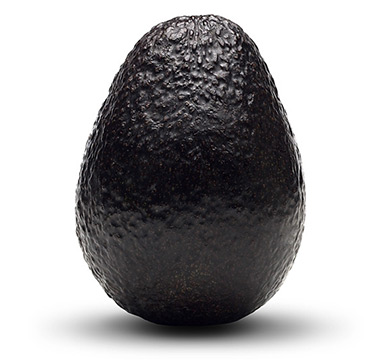
Hass Avocado Board Supports Nutrition Research
The Hass Avocado Board (HAB) is a promotion, research and information organization under supervision of the United States Department of Agriculture. HAB has a science research pipeline of ongoing clinical studies investigating the relationship between fresh avocado consumption and weight management and risk factors for cardiovascular disease and diabetes. And, based on their nutrition and phytochemical components, emerging research suggests that avocados may play benefit many emerging areas, including skin, eye, joint and cellular health.
More information on avocado nutrition research
1. Comerford KB, Ayoob KT, Murray RD, Atkinson SA.The Role of Avocados in Complementary and Transitional Feeding. Nutrients. 2016 May 21;8(5).
2. Kopec RE, Cooperstone JL, Schweiggert RM, et. Al. Provitamin A carotenoid absorption and conversion from a novel high ß-carotene tomato and from carrot is enhanced with fresh Hass Avocado. J Nutr. 2014; 144(8): 1158-1166.

